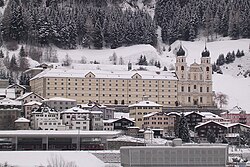Disentis Abbey
| Imperial Abbey of Disentis | ||||||||
|
Reichskloster Disentis (de) Abbazia Imperiale di Disentis (it) Claustra Imperiala da Mustér (rm) |
||||||||
| Imperial Abbey of the Holy Roman Empire | ||||||||
|
||||||||
| Capital | Disentis Abbey | |||||||
| Languages | Romansh, Highest Alemannic | |||||||
| Government | Theocracy | |||||||
| Historical era | Middle Ages | |||||||
| • | Founded | ca 720 | ||||||
| • | Gained immediacy | probably 8th century | ||||||
| • | Grey League founded | 1395 | ||||||
| • | Grey League became Swiss associate |
1497 |
||||||
| • | Joined Swiss Congregation | 1617 | ||||||
| • | Burned and plundered by French troops |
1799 |
||||||
| • | Placed under state control by Graubünden |
1846 | ||||||
| • | Abbey restored | 1880 | ||||||
|
||||||||
| Today part of |
|
|||||||
Disentis Abbey (German: Reichskloster Disentis) is a Benedictine monastery in the Canton of Graubünden in eastern Switzerland, around which the present town of Disentis (Romansh: Mustér) grew up.
Formerly the date of the foundation of this abbey, attributed to the local saints Placidus and Sigisbert, was held to be 614. The tradition further states that this monastery was destroyed by the Avars in 670, when the abbot and thirty monks were martyred. The abbey, dedicated to Saint Martin, was then supposedly rebuilt by Charles Martel and Saint Pirmin in about 711.
The second and current view, based on more substantial research, is however that the foundation did not take place until the early 8th century. This is corroborated by archaeological investigation showing that the first traceable structure on the site was built in or about 700 and was destroyed in about 940, which is attributed to raiding Saracens.
The account of Sigisbert, as dramatised in the 12th century work, the "Passio Placidi", is that he was a wandering Frankish monk, inspired by the ideals of Columbanus and Luxeuil, who set up a cell here, under the protection of Saint Martin. Placidus was a local magnate and landowner, who supported Sigisbert, and who was murdered by Victor, the praeses ("president") of Chur, in an attempt to prevent the loss of independence involved in the transfer of a large amount of land to the church.
...
Wikipedia


